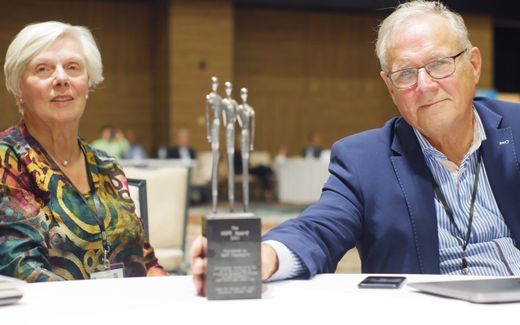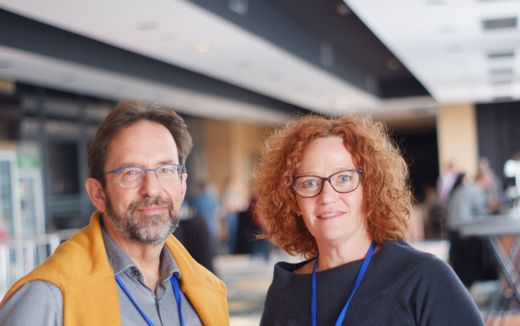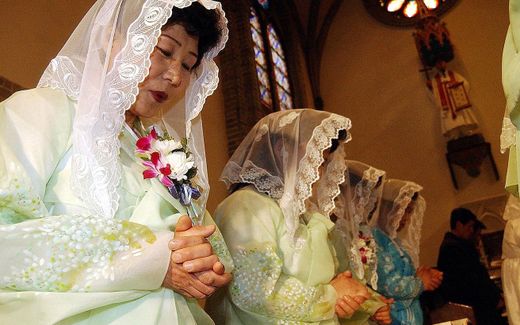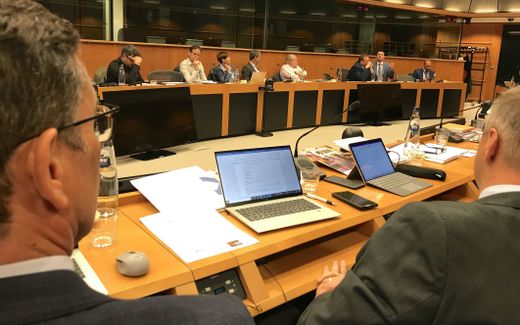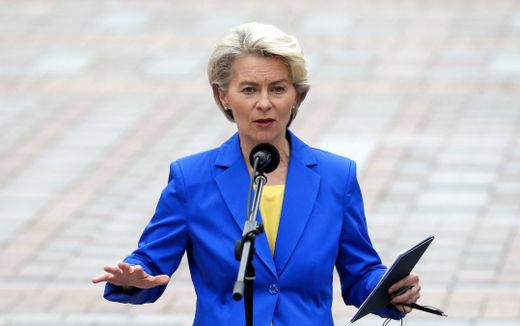Jeff Fountain: A missionary in the squatted house of Europe
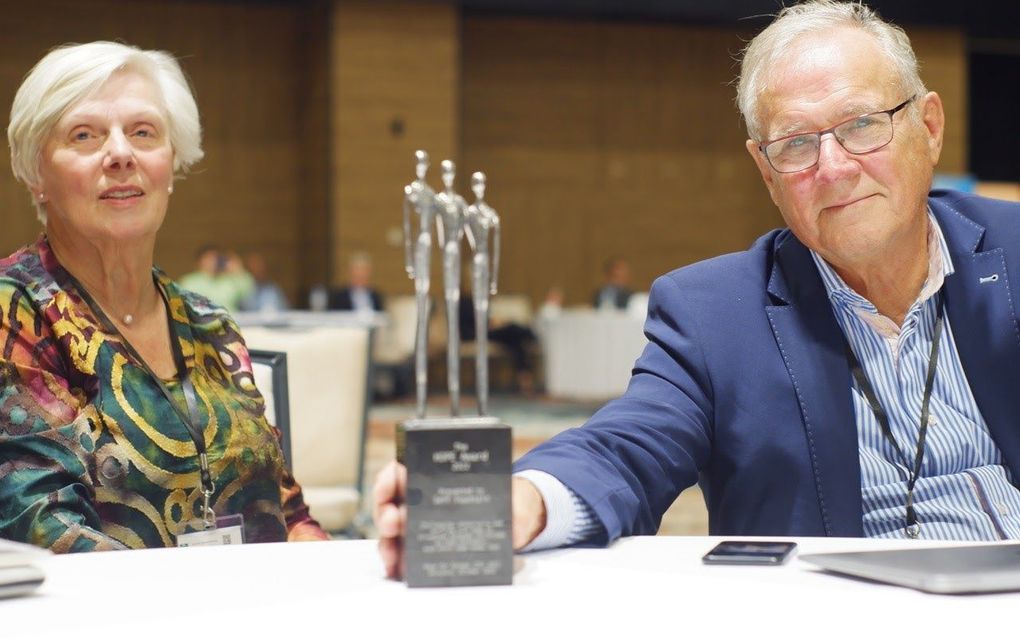
Jeff Fountain (right) with his wife Romkje (left) and the European Hope Award. Photo CNE, Evert van Vlastuin
Christian Life
Jeff Fountain received the European Hope Award for 2022. In 2015, he was portrayed in an interview in the Dutch Reformed Daily. Today, we give an updated version of that.
Jeff Fountain was born in New Zealand, the "world's last bus stop". But his calling was to Europe. Not just to the Netherlands, where he has lived for 40 years. He wants Europe to recognise its own Christian roots. And the biblical inspiration behind European integration.
Some years ago, when he and his wife Romkje were living in the Dutch countryside, a willow tree near their house split in a storm. Men with chainsaws removed the broken branches. Fountain thought it strange that they left the stump standing. But to his surprise, new shoots began to grow out of it.
The New Zealander saw in the archetypal Dutch tree a picture of the renewal of the church in our time. Despite parts being rotten and broken, new life was sprouting.
As an Evangelical Christian, he grew up among 'loose branches'. Over time he has recognised the need to learn from other traditions.
"Someone said: 'Catholics see woods; Protestants see trees', and I would add 'Evangelicals see branches'. Catholics belong to a world church; Protestant churches began as territorial churches: the Church of England, and the Dutch Reformed, focusing on their own country. But Evangelicals focus even more narrowly on the local church."
Jeff Fountain was born in New Zealand in 1949. In 1976, he married Romkje de Graaf in the Netherlands. They have three sons and eight grandchildren.
From 1980 to 1993, he and his wife led the Heidebeek training centre of Youth with a Mission in Heerde. From 1990 to 2010, he was the European director of YWAM.
In 2010, he wrote "Deeply Rooted" on the Christian basis of European integration. Every year around 9 May, he and the Schuman Centre convene the State of Europe Forum conference in the country presiding over the EU.
In 2017, Jeff and Romkje moved to the heart of Amsterdam, where they continue to oversee the activities of the Schuman Centre.
How did you come to the Netherlands?
In 1974, I was the manager of a Canadian music group, Shekinah, which toured England and the Netherlands, holding concerts in cathedrals and churches. The concerts were worship events with song, music and dance. The dance was new for many in our audiences."
Do you understand that hesitation with dance as worship?
"Yes, dance can have a sensual dimension and can distract from God. But with a pure heart, you can worship through dance, as did David, for example.
Back in Canada, after the tour, I received a letter inviting me to return to the Netherlands to work as an editor with Youth With A Mission. This confirmed a strong impression I had already received that God wanted me to come back to Europe, return to my former work as a journalist, and live in a community.
Actually, I intended to stay for a year or two and then return to New Zealand. But in the Netherlands, I met my wife Romkje, who had founded the Dutch branch of Youth with a Mission in 1973. She anchored me to Europe. After ten years, I had a Dutch passport. And in 1990, I became the European director of Youth with a Mission."
Have we Dutch been kind to you?
"Definitely. With the Dutch, you know where you stand: they are straightforward. I had to get used to that, but I also learnt to appreciate it.
Of course, I had the privilege of getting to know some wonderful Dutch people who are international heroes: Corrie ten Boom, with whom my wife worked, and Anne van der Bijl."
And where is home now: in New Zealand or at Schiphol Airport?
"When we are on leave in New Zealand, I can feel at home there. But soon, I begin longing for Europe again. That's where my calling lies. I am a missionary member of the Baptist church where I grew up in Auckland.
New Zealand is the world's last bus stop. You can't go any further without coming back. If you draw a 1000-kilometre circle around Auckland, you enclose maybe 5 million people. Such a circle around Amsterdam, where we now live, embraces 250 million people. There is much more activity here. That motivates me.
New Zealand is a beautiful country, with mostly nice weather. If you like nature and sports, it's paradise. But it also has few heroes other than sports people. You miss the richness of history there."
Fountain grabs a photo book and looks for shots of Utrecht. "On Dom square, you can find evidence of the conversion of many European peoples such as Romans, Irish Celts, Scots, English, Frisians, Franks, Saxons and even Vikings. There is a copy of the Jelling Stone, a Danish stone on which King Harald tells how he brought the Norwegians and Danes together under the Gospel. Without Christianity, Europe would have remained a pagan peninsula of Asia. Now it has its own identity because of the Gospel. Jesus' message has shaped history. And so why not the future?"
You have a vocation in Europe. What is it?
"Making Europe aware of its Christian roots, starting with Christians. After I laid down my YWAM leadership, I founded the Schuman Centre for European Studies. That is a network of people promoting an understanding of the role of the Bible in shaping our past, including the Christian inspiration of the drivers of European integration, such as Robert Schuman. Our task is to jog memories about history, stir consciences about the present and awaken imagination about the future.
Schuman escaped from German captivity during the war and started thinking about the future of Europe. A devout believer, his guiding thought was: what sort of Europe does God want?
Schuman saw reconciliation with Germany as compelled by the commandments of Jesus to love your neighbour and your enemy. After the war, as a French foreign minister, he continued this quest. So, on 9 May 1950, he declared the formation of the European Coal and Steel Community (ECSC), which laid the foundation for the European house. Today, 500 million Europeans live together in peace. German Chancellor Adenauer and Italian Prime Minister De Gasperi were other prime movers in this project. Later, French president De Gaulle thought this was ridiculous at the time. Since when was a losing country treated as an equal?
For Schuman, Adenauer and De Gasperi, it was a spiritual matter. Just before signing the ECSC treaty, they visited a monastery together for a prayer retreat."
The three men you mentioned were Roman Catholics. Does that make a difference?
"They were committed to strong Biblical values of equality, peace, freedom and human dignity. Schooled in Catholic Social Teaching, they understood humans to have been created in the image of God. Hence the solidarity of the human race, French and Germans included. Their project was not a Catholic project. It was for the common good of all."
Can this Christian inspiration still be seen in the European Union?
"With difficulty. That is a concern. People talk a lot about values: freedom, equality and fraternity. Or human dignity. These values have been separated from their Biblical roots. They begin to mean something different. Too often, Europeans try to hold onto the fruit without recognising the roots. Like cut flowers, they are doomed to wilt.
Take the American Declaration of Independence, for example, which declares that "we hold these truths to be self-evident: all men are created equal". Yet, in a Hindu country like India, no one considers human equality self-evident. You have the Brahmin at one end of the social scale and the Untouchables at the other.
Where did this idea of equality come from? No, not the French Revolution, which resulted in gross inequalities. But from the biblical understanding that humans are created in God's image.
If we are merely products of slime plus time plus chance, where does our dignity come from? Or equality? Can we talk of brotherhood and fraternity without starting with a father? Have there ever been brothers without a father?
At a symposium on children's rights at the University of Amsterdam, I once heard speaker after speaker say how difficult it was to define human dignity. That's true when we take God out of the picture. Why not follow the law of the jungle and just let the fittest survive? Without God, we are left with "might is right", the logic of a godless evolution.
Schuman and the other framers of the European Convention on Human Rights (ECHR) assumed humans to be bearers of the image of God. When we are silent about God, we see human rights as coming from the government or the UN. Governments, however, can only recognise rights, not grant them."
Sometimes, I compare Europe to a squatted house. Secular Europeans live in a house built on Judeo-Christian foundations but give little thought to the origins of their values. They have the attitude of squatters, perhaps using the same words but with different content."
Are Christians engaged with Europe?
"Too little, I think. I come across many French, Germans and British, but few 'Europeans'. There are, of course, many individual Christians active in the EU. But there is a lack of a framework for interpreting Europe Christianly, especially among Evangelicals.
Here in the Netherlands, we do not realise how much our identity comes from relationships with other countries. For example, the Dutch House of Orange has no Dutch blood, only German and Russian forefathers! Where did Christianity, the Renaissance and the Reformation come from? Not from within Holland! Holland has always been a trading nation, dependent on commerce with others for its well-being. We are part of a bigger family.
Thinking about Europe, we need to ask, like Schuman did: what does God want? Psalm 121 says: How blessed it is that brothers live together in peace. Surely that should be true for nations too!
The 70-plus years of peace since the Schuman Declaration is historically exceptional. European integration is a great experiment.
I am always impressed by those translation booths in the European Parliament. That respect for the diversity of languages is symbolic. Jaw, jaw, jaw is better than war, war, war, said Churchill.
Yet this year, this peace has been severely threatened. We now realise what we have taken for granted has been a gift of grace."
And yet criticised. Has the experiment failed?
"If it has, whose fault is that? In 1992, European Commission President Delors said to church leaders: 'help us find the soul of Europe. Otherwise, the game is over.'
What have we contributed to the recovery of the soul of Europe? Too often, we have stood on the sidelines and criticised. Schuman talked of the soul of Europe as the well-springs of our civilisation - Christian truth. Yet so often, Christianity has entered into unholy alliances with power instead of service. Money and individual freedom have become our gods.
Schuman also talked about the spirit of Europe, recognising the spiritual source of Europe's well-being and thus choosing for the welfare of all, the common good, and solidarity not only with other Europeans but the whole human race.
So, what does the future look like?
"The future is full of choices. Even if times look gloomy, the Holy Spirit has a habit of starting with fresh life from unexpected sources - as we now see with missions to Europe from Africa, Asia and Latin America. Christianity is all about death and resurrection. From the Lord's Prayer, we understand that God wants his kingdom to come, his will to be done on earth, in Europe, Ukraine and Russia, as it is in heaven. For it is always God's will for his will to be done!
We need to realise that the wheat grows alongside the tares. Too often, the tares get all the attention. Look also to see what God is doing.
We also need to know that God has always used faithful minorities to make a disproportionate impact on the course of history. That is the story of Europe's past. Why can't it be the story of Europe's future?
Our hope is not based on circumstances or trends. It is rooted in the Trinity: the person, promises and purposes of the Father; the death and resurrection of the Son; and the promise that the Spirit will be poured out on all flesh."
An earlier version of this interview was published in Dutch in Reformatorisch Dagblad in May 2015.
Related Articles


